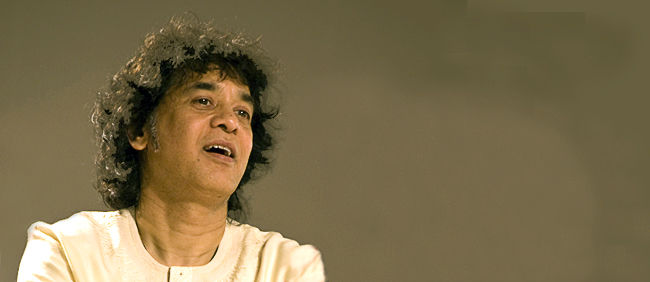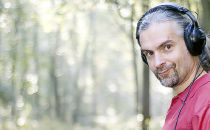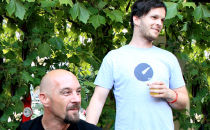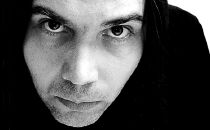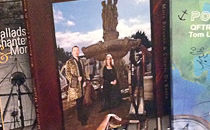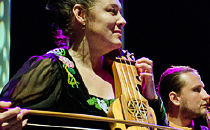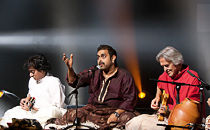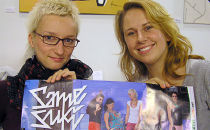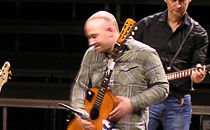Shakti is one of the first groups to combine classical Indian music with jazz, rock and other music genres. It was a big experiment when the band was formed in the seventies. How was Shakti music received in India then, especially among the masters of traditional music?
When Shakti came into existence in 1975 it was the really first time when the Indian music and jazz was used in the improvised form. It was also the first time when the south and north Indian music was being played together so even in India it was something that people were surprised that happened. For the masters from the south and north India it was very difficult to understand it, why it was possible and they were very critical for the group. But the young public of India was very much supportive of Shakti. They really enjoyed listening to us. It was one of the most popular bands in India. Thousands of people would come to hear it. In the last 20 years Shakti has become in India the big band where milions of people hear this group.
Now the musical combination in Shakti is even more expanded - beacuse it has south and north Indian music, even Bollywood elements, plus jazz, rock and plus electronic.All of these is added to the present form of Shakti. It is even more variant than it was before. The audience in India are even more fans of this version of Shakti than they have ever been before.
Tell me please about your first visit in Poland which took place in 1977.
When the Shakti was first together in 1975 we came to Warszawa and played a concert there. And I remember it was very well attended. A lot of people came and loved listening to us. We were very excited to play in that part of the world because we had never been there and it was so difficult to go to the eastern part of Europe at that time. Now it is all opened and the audience have much more freedom to attend the concert. Now they also have much more information about our music, they can see us on youtube, video, read about us in the internet... When they come to see us play, they know what we do and they understand what we do. So it is why now it is much more fun to play in countries like Poland, Czech Republic, Slovenia... We really look forward to playing in these places because they have a very old tradition of music. Because of it the fans understand what we do and for us it is very satisfying to play there.
What material are you going to perform in Poland?
We have been working on the new songs that we have been practising, so we will play new 5-6 songs that we have composed because our singer, Shankar Mahadavan, is one of the most famous Bollywood singer and composer from India. So we will add that kind of the music into our show. At the moment we are rehearsing, composing music which has more vocal songs than ever before. Plus we will play material from the old Shakti - from the 1970s and also from Remember Shakti of 10 years ago. It is very expanded repertoire, we will perform 15-16 songs in the evening. People will get many different kinds of compositions, some of them will use electronics, some of them use jazz, or north, south India raga system. It is gonna be the whole variety of music that we are planning to play for the audience in Poland.
Sounds great! I can’t wait to hear it!
Thank you very much.
Have you heard any Polish pieces of traditional music?
Unfortunately not, because up to recent time Poland had been closed to the rest of the world. Only in the last 20 years it has opened up so I had not been able to have a chance to listen to Polish music earlier. But I know here there is a tradition of western classical music that exists in that part of the world. There are some exceptional Polish jazz musicans - I have listened to them. But I do hope that when I come to Poland this time there will be more chances to listen to some Polish music. It would be nice.
Let's talk more about your activities. During your life you have collaborated with many famous, world-wide known artists.
[Laughing] I am very lucky! I have just finished a long tour with Herbie Hancock, who is a great jazz pianist player. We have travelled and performed in South America - in Brazil, Chile, Peru, Argentina... It was a fabulous tour! Just before that I had a tour with a jazz saxophone player, Charles Lloyd so that was great and now I am gonna have a tour with John McLaughlin, so it is amazing to play with the three greatest legends of jazz one year. I feel I am very lucky to play with these people. Apart from that I play with "Grateful Dead", the great rock band from USA. I also do music with ballet companies, with the symphonic orchestras, I wrote a symphony for National Symphony Orchestra of Washington DC also for the Nashville and Detroit Symphony Orchestra so those are also now on records then. It is nice to have that. I played also with a Béla Fleck who is a banjo player, a classical double bass player named Edgar Meyer. So it is many combination of things that I do and I am very lucky to do it. I just wrote a ballet music for the ballet company from San Francisco, new work, re-do of Korsakow’s music of "Scheherazade". It is all very diverse, I am very lucky that I get all of the them.
Which of these collaborations turned out to be the most unpredictible and astonishing for you?
The most unpredictable for now has been one that I did with the San Francisco Ballet - which was very recent. One hundred years ago ballet lose a piece called "Scheherazade", written by the russian composer Korsakow. They asked me to write a new score based on this western classical symphonic one of Korsakow. I didn’t know what was going to happen if I used Indian, arabic and western instruments, to combine all of these together for the first time in an orchestral piece with ballet. I didn’t know how it was going to work.
When I wrote it and we started rehearsing I was very afraid, because it wasn’t sounding like a ballet would be. But by the time we arrived in Monte Carlo for the premiere with ballet house and they got on the stage to perform, the audience became so much excited about the music and the ballet that we got a standing ovation for five minutes and I was so astonished the way all it worked in live performance. I had never thought that it would happen, in fact, I was deciding to not even be there to take a bow because I wasn’t sure if it was going to be good, but it turned out to be great!
Talking about music, where do you find inspiration for composing?
I find inspiration from the musicians I play with and from the audience. When I am playing with new musicans, how do they react to my music shows me differents parts of the music that I see from their point of view, shows me a new angle into my own music. It inspires me to work with that new idea, new angle, new possibility so that inspiration connected with the musicians is very, very helpful to me. And also from the audience - how do they react to my music inspires me to be able to play better and better. So these are two very important, inspiring elements. And apart from that – the elements of nature - how beautiful the sunset is, how create the sun rises, how beautiful the moon looks, how the rain smells, the rhythm of the rains falling to the ground, the way the horses run and their rhythm, the way the deer jumps... All of these are very much inspiring for me to be able to include in my music because I am a rhythm player.
You are also a teacher. Are you a demanding one? Let me ask you a controversial question: how it is with tabla - how long has one to practice to be a good tabla player?
My teacher was very demanding for me. He has always wanted me to practice for 6-7 hours every day and listen to all sorts of music every day. He also told me: "You don’t have to go to school to study, you don’t need to learn history, languages, because you will play tabla, concentrate only on it" but of course my mother made sure that I went to school and study. I got a good education so that is helping me now.
I am a demanding teacher only because I want the student to understand the importance of what they are doing. I don’t demand that they have to practice all day and listen to music all the time, that they don’t have to take the education, but only music – this is not the way I look at it. But I make sure that all the time spent with me is focused on learning to play.
Tabla is a highly refined way of playing rhythms - the technique on the instrument is very muscular. Once you’ve mastered the technique, you can play any another percussion instrument from anywhere in the world - it is not a problem. Therefore it is also possible for a tabla player, to learn to play the rhythms of all these other rhythms instruments of the world – f.ex. from Africa, Latin and South America.
So once you become technically good with the tabla, then you can make the tabla more international rhythm instrument. I try to get the technique of the instrument playing into the student and then to learn the compostion, repertoire - then everything is very easy. The technique is the most important part so I make sure that they get that.
You have received numerous grants and awards, even from Government of India. Which one are you the most proud of and which one is the closest to your heart?
Well, I have to say that the most important award I got was when my teacher came on the stage while once I was playing in India and gave me a flower and blessing. It is very important when your teacher is the most satisfied with your work. If he is, than it is the best award you can ever get. So, I was very happy that my teacher did that. The other one that I am very proud of is the Grammy that I got three years ago when I made a record called "Global Drum Project" and it won the best music award. It was an international award and it came from the musicians so I am very happy that I was able to get that.
What are your upcoming plans?
My plan is to finish this tour with Remember Shakti - hopefully we will be able to make a record from this tour and make a big tour in America and Asia next year or two, but I also I have to go to India for the winter concert season, then take my "Masters of Percussion" group to America in April – I have a big tour with them - more than 20 concerts to play.
At the very end, please, tell a few words especially for the Readers of Folk24 Magazine!
Please come and watch Remember Shakti on the 22nd November in Warsaw because it is one of the most exciting groups in the world. It is very rare to see musicians sitting together and creating music right there for the audience - it is very fresh, great to watch and fabulous to listen, so come, watch and listen!
Thank you for a nice talk and have a great time in Poland!
Thank you.
